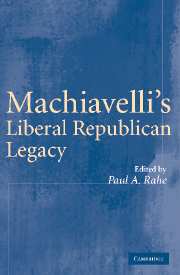Book contents
- Frontmatter
- Contents
- List of Contributors
- Acknowledgments
- Abbreviations and Brief Titles
- Introduction: Machiavelli's Liberal Republican Legacy
- Prologue: Machiavelli's Rapacious Republicanism
- PART I THE ENGLISH COMMONWEALTHMEN
- 1 Machiavelli in the English Revolution
- 2 The Philosophy of Liberty: Locke's Machiavellian Teaching
- 3 Muted and Manifest English Machiavellism: The Reconciliation of Machiavellian Republicanism with Liberalism in Sidney's Discourses Concerning Government and Trenchard's and Gordon's Cato's Letters
- PART II THE MODERATE ENLIGHTENMENT
- PART III THE AMERICAN FOUNDING
- Index
2 - The Philosophy of Liberty: Locke's Machiavellian Teaching
Published online by Cambridge University Press: 24 July 2009
- Frontmatter
- Contents
- List of Contributors
- Acknowledgments
- Abbreviations and Brief Titles
- Introduction: Machiavelli's Liberal Republican Legacy
- Prologue: Machiavelli's Rapacious Republicanism
- PART I THE ENGLISH COMMONWEALTHMEN
- 1 Machiavelli in the English Revolution
- 2 The Philosophy of Liberty: Locke's Machiavellian Teaching
- 3 Muted and Manifest English Machiavellism: The Reconciliation of Machiavellian Republicanism with Liberalism in Sidney's Discourses Concerning Government and Trenchard's and Gordon's Cato's Letters
- PART II THE MODERATE ENLIGHTENMENT
- PART III THE AMERICAN FOUNDING
- Index
Summary
John Locke has been accused of being a Calvinist, a Socinian, an atheist, a Hobbesian, an elitist, a product of his times, and even a neurotic – but never a Machiavellian. On the face of it, this is easy enough to understand. Nowhere does Locke acknowledge any debt to Machiavelli, nor does he leave behind any written expression of admiration for the Florentine thinker. Characteristic Lockeian concepts such as the state of nature do not show up in Machiavelli's writings. In fact, Machiavelli is notable for his silence on natural law, which is a key component of Locke's teaching. Furthermore, common opinions about Machiavelli himself – that he was a Renaissance humanist, an Aristotelian, a patriot, or even a teacher of evil – do not seem to point in Locke's direction. John Locke has a reputation for sobriety rather than wickedness, and his position on the brink of the Enlightenment seems far removed from Renaissance Italy.
In spite of the evidence suggesting that there is little reason to make a philosophical connection between the two thinkers, there are details that suggest that Locke was indebted to Machiavelli. The first and most obvious is that Locke was an avid collector of Machiavelli's books, and there is no reason to think that he did not read them. The second and less obvious is a connection between their books. Both the Florentine and the Englishman cite a particular speech from Titus Livy's History of Rome (9.1).
- Type
- Chapter
- Information
- Machiavelli's Liberal Republican Legacy , pp. 36 - 57Publisher: Cambridge University PressPrint publication year: 2005
- 3
- Cited by

